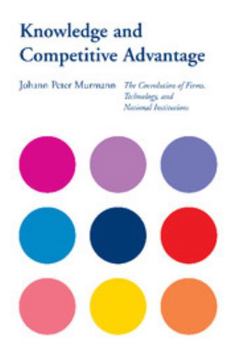Knowledge and Competitive Advantage: The Coevolution of Firms, Technology, and National Institutions
(Part of the Cambridge Studies in the Emergence of Global Enterprise Series)
Select Format
Select Condition 
Book Overview
A comparison of the development of the synthetic dye industry in Great Britain, Germany, and the US. The rise of this industry constitutes an important chapter in business, economic, and technological history because synthetic dyes - invented in 1857 - represent the first time that a scientific discovery quickly gave rise to a new industry. British firms led the industry for the next eight years, but German firms came to dominate the industry for decades before WWI, while American firms played only a minor role during the entire period. This study identifies differences in educational institutions and patent laws as the key reasons for German leadership in this industry. Successful firms had strong ties to the centers of organic chemistry knowledge. The book also argues that a complex coevolutionary process linking firms, technology and national institutions resulted in very different degrees of industrial success for dye firms in the three countries.
Format:Hardcover
Language:English
ISBN:0521813298
ISBN13:9780521813297
Release Date:November 2003
Publisher:Cambridge University Press
Length:318 Pages
Weight:1.25 lbs.
Dimensions:1.0" x 6.3" x 9.2"
Customer Reviews
2 ratings
Excellent read -- well worth the effort
Published by Thriftbooks.com User , 17 years ago
This is a highly academic book -- one that I read in getting my PhD -- and hence is not an easy book for a casual historian student to read. A reader should have an interest (or a grounding) in sociology or organzational theory. However, if you make the effort to read Murmann you will develop an excellent understanding of how industries and nations evolve, and how the surrounding institutions (universities and patent laws) are an important contributor to economic development. So for the right reader it is a superb book. I read a copy taken out of the library and liked it so much that I bought a copy for my bookshelf.
Well worth its Schumpeter prize
Published by Thriftbooks.com User , 18 years ago
This book well deserves the $10,000 prize which the Schumpeter Society awarded it. It throws a brilliant new light on the development of one of the key factors shaping the modern business world, intellectual property. As just one example, the first synthetic dyes were invented and innovated in England, yet within 40 years, German firms held 95% of the world market for them. Murmann explains how much this owed to the way the Germans gave their firms a level of patent protection in 1877 which was not matched in Britain until 1905, by which time it was too late.






